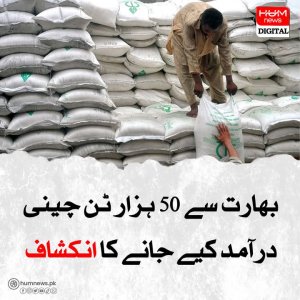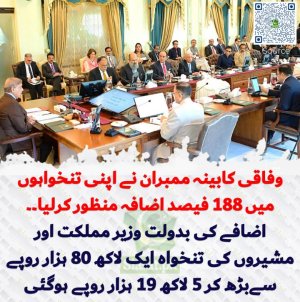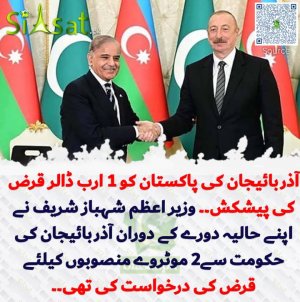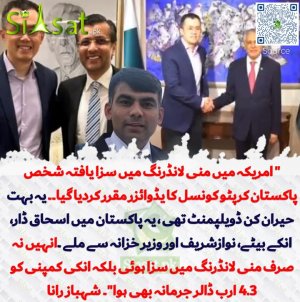Fitch upgrades Pakistan’s credit rating to ‘B-’ on improving deficits, reforms
Global ratings agency Fitch on Tuesday upgraded Pakistan’s foreign currency credit rating to ‘B-’ from ‘CCC+’, citing increased confidence in the country’s
progress on narrowing its budget deficits.
The upgrade also reflects confidence that the country would implement structural reforms, supporting its International Monetary Fund (IMF) programme performance and funding availability, Fitch said.
The agency said though ongoing global trade tensions could create external pressure, its low dependence on exports and market financing should mitigate risks.
Prime Minister Shehbaz Sharif welcomed the upgrade, calling it a reflection of economic progress and the world community’s confidence in the national economy, the
Associated Press of Pakistan reported.
He said the upgradation of Pakistan’s credit rating was highly encouraging.
“Fitch has declared Pakistan’s economy as stable. The improvement of economic rating by international institutions reflects economic progress and the global community’s confidence in the country’s economy,” he remarked.
PM Shehbaz said that the incumbent government was working tirelessly to bring further improvement to the national economy.
Welcoming the upgrade by the agency, Finance Minister Muhammad Aurangzeb said that it was a “strong expression of confidence in the country’s economic reforms and policies”.
He said that the agency’s step will further strengthen the government’s economic agenda.
After this announcement, the finance minister said, more investment, trade, increased employment opportunities, industrial development and additional resources will be available to the country.
“The government will continue the journey of economic reforms and economic stability,” he said, adding that the economy will further improve and stabilise in the future.
APP reported that he later said the international rating agency has upgraded Pakistan’s economic rating due to its sustainable macroeconomic stability.
He said the development was a very promising outlook.
Aurangzeb said the country’s foreign remittances were recorded high at $4.1 billion, which were likely to go up to a record $38bn by the end of this year FY 2024-25.
The minister said the country’s economy was currently moving in the best direction, which required continuity so that economic growth could be sustainable and inclusive.
He said that because of the structural reforms of the current government and the cooperation of all institutions, the country’s economy has achieved macroeconomic stability.
Aurangzeb said that the current government had achieved many successes in the economic sphere and the successful holding of the recent International Mineral Conference was a great success of the government.
In a post on X, Adviser to the Finance Minister Khurram Schehzad said that the outlook was stable, adding that the agency’s decision was a strong endorsement of the government’s economic policies and outcomes.
The economy had been teetering on the brink of default ever since inflation rose to a record high in May 2023 and reserves started shrinking but has seen some respite thanks in part to a
$7 billion bailout programme from the IMF.
In March, the IMF reached a new deal with Pakistan, which could unlock $1.3bn in cash.
According to the update on Fitch’s website, Pakistan performed well on quantitative performance criteria, particularly on reserve accumulation and the primary surplus, although tax revenue growth fell short of its indicative target.
“Provincial governments have also legislated increases in agricultural income tax, a key structural benchmark,” it said.
“This follows Pakistan’s strong performance on its previous, more temporary arrangement, which expired in April 2024,” it added.
The agency forecasted that the government budget deficit would narrow to six per cent of GDP in the fiscal year ending in June and around 5pc in the medium term, from nearly 7pc in FY24.
“Our FY25 forecast is conservative. We expect the primary surplus to more than double to over 2pc of GDP in FY25,” the agency said.
“Shortfalls in tax revenue, in part due to lower-than-expected inflation and imports, will be offset by lower spending and wider provincial surpluses,” it said, adding that the lagged effects of high domestic interest rates in recent years still weigh on fiscal performance, but also drove the State Bank of Pakistan’s (SBP) extraordinary dividend of 2pc of GDP to the government in FY25.
“Government debt/GDP dropped to 67pc in FY24, from 75pc in FY23, and we forecast a gradual decline over the medium term, reflecting tight fiscal policy, nominal growth and a repricing of domestic debt at lower rates,” it said.
However, the agency said, the debt ratio would tick up in FY25 due to a rapid decline in inflation and would remain above the forecast ‘B’ median of just over 50pc.
“The interest payment/revenue ratio, which we forecast at 59pc in FY25, will narrow, but remain well above the ‘B’ median of about 13pc, given a high share of domestic debt and a narrow revenue base,” it said.
“We expect CPI inflation to average 5pc year on year in FY25, from over 20pc in FY23-FY24, on fading base effects from several rounds of energy price reforms, before picking up again to 8pc in FY26, in line with urban core inflation over the past few months,” Fitch said.
The agency added that the SBP held its policy rate steady at 12pc in March, noting pressures on the current account and persistent core inflation, after 1,000bp of rate cuts between May 2024 and January 2025.
“We expect GDP growth to edge up to 3pc in FY25,” it said.
“Pakistan posted a current surplus of $700 million in 8MFY25 on surging remittances and favourable import prices,” the agency said.
“Imports picked up in early 2025, and we expect external deficits to widen from our forecast of a broadly balanced position for FY25 on stronger domestic demand.”
It said that, however, they should remain below 1pc of GDP in the coming years.
“We think some informal FX demand management persists after the loosening exchange rate and import controls, and market reforms in 2023,” the agency said.
Fitch said that international trade tensions could hurt goods exports, with exports to the US, mostly textiles, accounting for 3pc of GDP (35pc of the total) in FY24.
“Lower commodity import prices could soften the blow on the trade balance,” it said.
“Remittances mostly come from the Middle East and tend to be resilient to the economic cycle,” it added.
“Pakistan has become less reliant on market and commercial financing in recent years, but market turmoil could still reduce access to loan funding.”
Fitch expected a further buildup of gross reserves after the SBP’s purchase of foreign exchange in the interbank market brought them to under $18bn in March, from about $15bn at FYE24 and a low of less than $8bn in early 2023.
“Measures of net foreign exchange reserves are much lower, reflecting foreign exchange reserve deposits of domestic commercial banks, a Chinese central bank swap line and bilateral deposits at the SBP.”
However, the agency still viewed gross reserves as the most relevant indicator of external liquidity.
Fitch predicted that the government will face about $9bn in external debt maturities in FY26 after over $8bn in FY25 (nearly $5bn in 2HFY25).
“Both figures exclude $13bn in bilateral deposits and loans that are regularly rolled over, of which $4bn is at the SBP.”
It said that the next international bond maturity was in September 2025.
“Besides bilateral rollovers, the authorities secured $4bn in external financing in 1HFY25 from a mix of multilateral and commercial sources and are expecting to obtain $10bn in 2HFY25, of which $4bn would be from multilateral and $5bn from various commercial loans, mainly refinancing from Chinese banks.”
“Governments from across the political spectrum have had a mixed record of IMF programme performance, often failing to implement or reversing the required reforms,” the agency said, adding that the current apparent consensus within Pakistan on the need for reform could weaken over time.
Says move reflects confidence that the country will implement structural reforms.
www.dawn.com

























